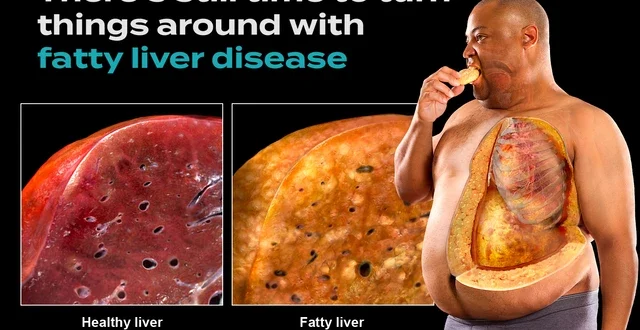Fatty liver disease, also known as hepatic steatosis, is a common condition that affects millions of people worldwide. It occurs when excess fat accumulates in the liver cells, potentially leading to more serious health issues if left untreated. Understanding the causes, symptoms, and management strategies for fatty liver is crucial for maintaining overall health and well-being. In this guide, we’ll delve into what fatty liver is, how it develops, and the steps you can take to manage and prevent this condition effectively.
What Is Fatty Liver?
Overview of Fatty Liver Disease
Fatty liver disease is characterized by the buildup of fat in the liver cells. While having some fat in the liver is normal, excessive accumulation can lead to inflammation and liver damage. There are two main types of fatty liver disease:
- Non-Alcoholic Fatty Liver Disease (NAFLD): This is the most common form and is not related to alcohol consumption. It’s often associated with obesity, diabetes, and other metabolic disorders.
- Alcoholic Fatty Liver Disease: This type is caused by excessive alcohol consumption. It’s typically seen in individuals who drink heavily over a prolonged period.
Causes and Risk Factors
The development of fatty liver disease can be influenced by various factors, including:
- Obesity: Excess body weight, particularly abdominal fat, is a major risk factor.
- Type 2 Diabetes: High blood sugar levels and insulin resistance contribute to fat buildup in the liver.
- High Cholesterol and Triglycerides: Elevated levels of these fats in the blood can lead to fatty liver.
- Poor Diet: Diets high in sugar, refined carbohydrates, and unhealthy fats can increase the risk.
- Sedentary Lifestyle: Lack of physical activity contributes to weight gain and fat accumulation.
- Genetics: Family history of liver disease or metabolic disorders can increase susceptibility.
- Alcohol Consumption: Regular excessive drinking is a significant risk factor for alcoholic fatty liver disease.
Symptoms of Fatty Liver
Common Symptoms
Fatty liver disease may not always present noticeable symptoms, especially in its early stages. However, some common symptoms include:
- Fatigue: Feeling unusually tired or weak.
- Abdominal Discomfort: Mild pain or discomfort in the upper right side of the abdomen.
- Unexplained Weight Loss: Losing weight without trying.
- Elevated Liver Enzymes: Detected through blood tests during routine check-ups.
- Enlarged Liver: May be detected through imaging tests or physical examination.
Advanced Symptoms
In more severe cases, fatty liver can progress to non-alcoholic steatohepatitis (NASH) or alcoholic hepatitis, which may present additional symptoms such as:
- Jaundice: Yellowing of the skin and eyes.
- Swelling: Abdominal swelling or fluid retention.
- Dark Urine: Urine may become darker in color.
- Itchy Skin: Persistent itching.
Managing and Preventing Fatty Liver
1. Lifestyle Changes
- Healthy Diet: Incorporate a balanced diet rich in fruits, vegetables, whole grains, and lean proteins. Reduce intake of sugary foods, refined carbs, and unhealthy fats.
- Regular Exercise: Aim for at least 30 minutes of moderate exercise most days of the week. Activities like walking, cycling, and swimming can help reduce liver fat.
- Weight Management: Achieving and maintaining a healthy weight is crucial. Even a modest weight loss of 5-10% can significantly improve liver health.
2. Medical Interventions
- Medications: While no specific medications are approved for treating fatty liver, managing underlying conditions such as diabetes and high cholesterol can be beneficial.
- Regular Check-Ups: Regular visits to your healthcare provider can help monitor liver function and track progress.
3. Avoid Alcohol
For individuals with alcoholic fatty liver disease, abstaining from alcohol is essential. Reducing or eliminating alcohol consumption can prevent further liver damage and improve overall health.
4. Monitor and Manage Comorbid Conditions
Managing related health issues such as diabetes, high blood pressure, and high cholesterol can help prevent the progression of fatty liver disease.
FAQ About Fatty Liver
Q: How is fatty liver disease diagnosed?
A: Fatty liver disease is often diagnosed through blood tests that show elevated liver enzymes, imaging tests like ultrasound or MRI, and sometimes a liver biopsy for more detailed examination.
Q: Can fatty liver disease be reversed?
A: Yes, fatty liver disease can often be reversed or significantly improved with lifestyle changes such as a healthy diet, regular exercise, and weight loss. Early intervention is key.
Q: Are there any specific foods to avoid if I have fatty liver?
A: It’s advisable to avoid foods high in saturated fats, trans fats, and added sugars. Focus on a diet rich in fruits, vegetables, whole grains, and lean proteins.
Q: How long does it take to see improvements in fatty liver?
A: Improvement timelines vary depending on the individual and the extent of lifestyle changes made. Generally, with consistent effort, improvements can be seen within a few months to a year.
Q: Is fatty liver disease hereditary?
A: While fatty liver disease itself is not directly hereditary, genetic factors can influence susceptibility to related conditions such as obesity, diabetes, and metabolic syndrome.
Q: Can children get fatty liver disease?
A: Yes, fatty liver disease can affect children, especially those who are overweight or have metabolic conditions. Early intervention with lifestyle changes is important for managing the condition in children.
Read more Jet2Holidays 2024: Your Ultimate Guide to Booking the Perfect Holiday
Conclusion
Understanding fatty liver disease and taking proactive steps to manage and prevent it can lead to better health outcomes and a higher quality of life. By focusing on a balanced diet, regular physical activity, and managing underlying health conditions, you can effectively address fatty liver and reduce the risk of complications. Stay informed, make healthy choices, and consult your healthcare provider for personalized advice and treatment options.

